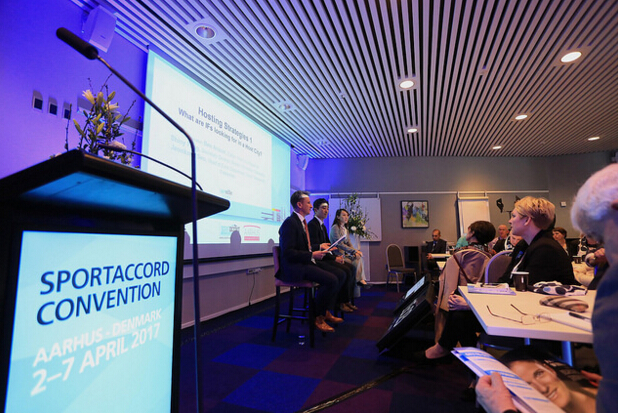Credit: Getty Image
2017-04-05
On the 4.4 2017 at SportAccord Convention, the panels on City Forum Hosting Strategies 1 and 2 were held.
The first part What are IFs looking for in a Host City was discussed by panel speakers Shiny Fang, Secretary General, UIPM, Modern Pentathlon Federation and Jeongkang Seo, Head, Event Department, World Taekwondo Federation. The panel was moderated by Ben Avison, Editorial Director, Host City Magazine. They focused on the some of the considerations of the sports federations when they evaluate their requirements for a host city and how these considerations have been influenced by the rapid changes in the sports industry recent years. Also the importance of a clear objective in bidding for hosting and the support of local government was discussed.
New technologies have changed the way audience consume sport, but one still shouldn’t ignore the special environment created at events. Shiny Fang said that completions are more events these days with audience participation.
It’s important to develop new fan-bases and engage young people in new sports to create the athletes of tomorrow even though the sports are not popular in that specific area. Shiny Fang thinks, it’s important to have accessibility, so cities should try to develop platforms for people to engage in sports. Jeongkang Seo mentioned how the city of Manchester build a new Taekwondo venue, which lead to the hosting of completions.
Cities seems to sway away from bidding for Mega Sports Events and instead want to host smaller events. With the changing consumption of sport, cities are re-evaluating the importance and legacy of these Mega events.
The second part Thinking creatively as an Event Host was discussed by Panel Speakers Michelle Collens, Manager, Sport Hosting Vancouver, and Dr Balázs Fürjes, Hungarian Government Commissioner, Former Bid Chairman, Budapest 2024. This panel was directed by David Simon, President, Los Angeles Sports Council. They discussed how cities best use their own character and culture when bidding for and hosting sports events.
Dr Balázs Fürjes mentioned three challenges when bidding to host the Olympics in 2024. Firstly, they haven’t bid to become a host city for a long time, so they had to rethink how to prove that they were capable of hosting a big event. Secondly, they were not a part of the global network and had to build relations from the beginning. And Thirdly, they had to gain the domestic support. Though Hungary did not win the bid, Dr Balázs Fürjes stresses that bidding is winning. Though the city of Budapest did not win, it did prove itself capable of hosting an event of this capacity through legacy planning. The best a city can do is to be the best version of itself and play to its strengths. Be the best Budapest.
Michelle Collens raised the same points in regards to Vancouver. They focus on rethinking how to create events and engaging the local community. She mentions how they made fan-based participation areas for Rugby-games so that people could enjoy the event without buying tickets. They are questioning and rediscovering the identity of Vancouver as to meet the expectations of the public and strengthening the participation.

